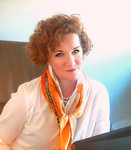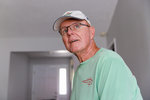


It all started when Ronnie Luck noticed that his wife, Phyllis, kept repeating herself.
“She’d ask the same question over and over again,” says Luck, with tears in his eyes, remembering the early days of her progression to a diagnosis of Alzheimer’s disease.
Luck, a former football coach and physical education teacher, retired as the assistant principal and athletic director at South View High School. He and Phyllis met in 1977, when she was teaching at Massey Hill Junior High School.
The two Fayetteville natives both taught school for more than 30 years in Cumberland County. They have three children, Keri, Casi and Kevin. His daughters both work for Cape Fear Valley Health.
Alzheimer's was a slow progression, and the repetition frustrated Luck. He says his wife began to get up and take walks, going farther and farther each day. She came to not recognize her husband and was even getting scared of him.
“One day, she knocked on a friend’s door and told my neighbor that there was a strange man in her house and that she was afraid,” says Luck.
Luck’s neighbor brought her back to their home and tried to comfort her, saying, “Now Phyllis, there is not a strange man in the house. That’s Ronnie, your husband.”
Phyllis had always been a free spirit and independent, Luck says. He calls her Rock, a nickname that refers to his health scares throughout their marriage.
“She held my hand through two rounds of chemotherapy. She’s my Rock,” says Luck.
After he and their children heard the Alzheimer’s diagnosis, he became Phyllis’ caregiver.
He began to look for an assisted-living facility when his wife’s long walks began to frighten him. She moved into Harmony at Hope Mills last July.
“I’d be so scared for her to get hurt, to get lost. She’d walk every day. She’d get sunburned, and I’d try to give her water, put cream on her,” Luck says.
Even as she can no longer remember her children or her past, Luck says, Phyllis has not lost her loving spirit.
“She tells everyone that she loves them. For our 32nd wedding anniversary on July 14, I didn’t bring flowers. I brought cupcakes for everyone at Harmony,” says Luck.
Phyllis is happy to be there, he says. He visits regularly — not just for her, but for himself.
“I could take her to the house that we built together. We designed it together. She bought every piece of furniture in it. But she wouldn’t recognize it,” Luck says.
Luck and his daughters have attended support group meetings at Cape Fear Valley Medical Center.
“It hasn’t been a walk in the park. I remember thinking I didn’t have much in common with anyone in the group since my wife was not that far along at the time, and I didn’t realize that I was en route,” Luck says.
Luck says the support group offered more resources and referrals than he expected.
Sam Hutchison, who manages Cape Fear Valley Senior Health Services as a licensed clinical social worker, says the support group helps caregivers cope.
“It’s a safe environment where they can talk about challenges with memory loss and learn how to communicate. There’s a lot of fear and denial from those with dementia and Alzheimer’s, and it helps to have support,” Hutchison says.
Hutchison says the group helps caregivers redirect their lives and deal with role reversal when memory loss occurs.
“When you have children taking care of their parents or spouses taking care of another, you are dealing with a loss of that person even when that person is still in their lives. It’s a huge challenge,” Hutchison says.
When caregivers are with others in the same situation, they can lean on each other and realize they are not alone. The support groups provide advice on tough topics such as when to take away car keys or even what to do when the patient becomes agitated.
Hutchison says a more complex challenge is that unlike other diseases, Alzheimer’s is incurable and irreversible. Isolation is real when it comes to caring for loved ones suffering from progressive memory loss, he says.
Luck says that what has helped him more than the support group was getting resources one-on-one from Hutchison.
“Caregivers can get burned out dealing with their loved ones who begin to require more and more, losing their independence. It is difficult to find anyone who can understand what you are experiencing and even more rare to find someone willing to take this journey with you. We try to empower our caregivers and try to help them focus more on quality of life,” Hutchison says.
With Alzheimer's patients, Hutchison says, it is important to remind caregivers of their loved one's victories so they have an understanding about what they are doing and encourage them.
Senior Health Services manages cases for patients age 60 and older. Thanks to a private donation, the health system has expanded these services and recently hired social worker Nancy Davis, who is dedicated to assisting the caregivers of Alzheimer’s patients, Hutchison says.
She helps with assisted-living and advanced-care planning, and with tough decisions, such as powers of attorney and wills. She helps manage crisis situations when caregivers might ignore their own health needs to take care of a spouse or parent.
“One of the main frustrations when a spouse or a parent finds a loved one with dementia is not knowing what to do or where to start to help get them care,” says Davis.
“There are so many questions, and to have a central location where someone who can help with long-term planning or get you the answers sometimes can mean a lot.”
“It’s not only about getting help to the patient but also peace of mind to the caregiver,” Davis says.
Hutchison agrees and adds that the navigation of health care and community resources can be one of the biggest obstacles a family can face.
“Our solution has been to connect families with a social work care navigator who is able to assess their situation and help them traverse the complexities of the system and provide the supportive counseling necessary to endure,” Hutchison says. “Connecting patients and families in need with our community partners and supporting them through individual and group counseling has been an effective approach to producing better outcomes.”
Luck says the donation has been well invested to help families who need emotional support and the resources to deal with the legal aspects of health care.
“The disease is here to stay, and it’s irreversible,” Luck says. “I would have tried anything. This helps families with the inevitable. We just cherish the moments we still have together.”
For more information on Cape Fear Valley Senior Health Services and its support groups, call 910-615-1781.